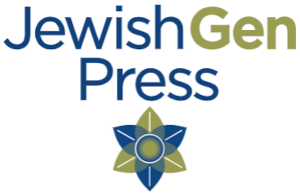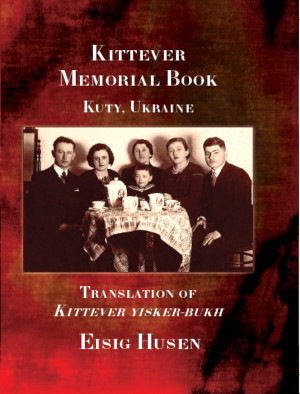

Translation of
Published by the JewishGen Press
By: Eisig Husen
Available from
for $32.00
Translated from Yiddish by Stanley Scheindlin, D. Sc.
Project Coordinator: Melina Kuflik McCauley
Cover Design: Rachel Kolokoff Hopper
Layout: Jonathan Wind
Name Indexing: Stefanie Holzman
8.5”x11”, 208 pages, hard cover with original photographs
 |
Details:
Kittev (Kuty) was established in 1715 by one of the barons of the Pototski family.
The Jews made their living in trade (especially in dried fruits), tanning, carting, and artisanship.
The synagogue, which was built in the first years of the community, was a glorious and the biggest of the city buildings. There were other, smaller synagogues, three study houses and little Hassidic synagogues. During the First World War the city experienced many changes: two Russian occupations (in 1914 and again in 1916), the establishment of the Western Ukrainian Republic (November 1918-March 1919), a brief occupation of the city by the Romanians, and then by independent Poland in June, 1919.
The majority of the Jewish parties that were active in Poland had branches in Kuty.
On September 17th, 1939 units of the Red Army occupied Kuty. On July 1st, 1941 the city was occupied by Romanian and Hungarian units, which were allies of the Germans. The Romanians left the city after a short time, and the city remained under Hungarian rule until the end of August 1941. In September 1941 the city was placed under the direct administration of the Germans and on September 7th, 1942 they completely annihilated the Kittev Jewish community.
Eisig Husen, the author of this book wrote:
May this book be a memorial to the thriving Jewish community of Kittev (Kuty) that is no more.
Kuty, Ukraine is located at 48°15' N, 25°11' E and 283 miles WSW of Kyyiv
|
 JewishGen Press
JewishGen Press
 JewishGen Home Page
JewishGen Home Page
Copyright © 1999-2025 by JewishGen, Inc.
Updated 19 Feb 2023 by LA